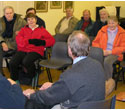SLIMBRIDGE DOWSING GROUP REPORTS
Neuro-linguistic programming - Ian Critchley

We never cease to be amazed at what our bodies and minds are capable of, how they protect us and know what is best for us, far better than we can know ourselves.
In his talk on hypnotherapy and neuro-linguistic programming (NLP) on 24th January, Ian Critchley explained that he does not use the dowsers’ pendulum to hypnotise people, but for getting in touch with the inner recesses of the mind.
After 12 years with Magnox at Berkeley, Ian has retrained as a life coach, working with people to raise their awareness and to work out what they want to achieve. This is done through the Unconscious mind, and the pendulum is a useful tool for communicating.
The unconscious mind is minutely aware of our state of health and can heal from within, in order to preserve our bodies and minds as best it can. It genuinely wants the best for us and even uses telepathy when needed. This is more developed in some individuals than others, and comes in very useful when dowsing!
“No hypnotist, however skilled he might be, can make anyone do anything outside their core values and beliefs,” says Ian reassuringly. “These come from conditioning in childhood, and make us who we are and behave the way we do.”
Equally, we can also have unresolved problems embedded in the unconscious mind, which is how phobias begin, even if we cannot consciously remember them. Indeed, the human memory can be quite selective, and simply refuse to remember experiences that are too painful or uncomfortable to deal with at a conscious level. Everything we experience is recorded in our subconscious and stays with us until we die. It becomes more difficult to access as it becomes buried but it is always there.
Ian explained that it is important to maintain a balance when helping people with phobias. He cannot entirely remove, for example, a fear of heights or fire, or a patient might end up taking unnecessary risks. Fear and anger have a purpose and suppressing them - frequently necessary in today’s society - can be extremely stressful.
Demonstrating on a couple of volunteers brought some interesting results, particularly when Ian raised the metabolic rate of one lady. This was your classic “Do not try this at home” experiment, but a member of the audience was invited to take the lady’s pulse, and was amazed to find it almost doubled from an unusually low 60 to a relatively rapid 120.
During a lively question and answer session at the end, someone asked about Time Lines. These are your perception of the past and of the future, most commonly envisaged with the past behind us and the future ahead, although not everyone sees them that way. During a life coaching session, Ian will ask the “patient” to envisage his time line, how it looks, what colour it is, and the location of things that have happened along its length. Once identified, it is possible to make adjustments, which can help people let go of something bad in their past and, having dealt with it, move on.












